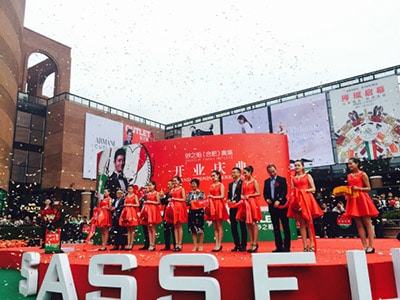
Sasseur’s Hefei outlet, one of the malls in the IPO’s portfolio
Chinese e-commerce giant JD.com continues to expand its brick-and-mortar empire, building on its existing ventures in physical supermarkets and convenience stores by taking a cornerstone stake in the IPO of one of the mainland’s largest outlet mall chains.
JD.com is joining logistics provider YCH and mainland investment bank Haitong International Securities in anchoring the initial public offering of Sasseur REIT, according to a Business Times account citing the prospectus. Beijing-based JD.com is China’s second-largest e-commerce provider after Alibaba.
The REIT’s initial portfolio comprises four mainland outlet malls with a combined value of about S$1.5 billion ($1.1 billion). Two of the malls are located in the southwestern metropolis of Chongqing, a third in Kunming, capital of southern China’s Yunnan province, and a fourth in Hefei, capital of the eastern province of Anhui.
Outlet Malls Continue to Shine in China
Sasseur, which is expected to list on the Singapore exchange at the end of this month, will be the first pure outlet mall REIT listed in Asia. The initial public offering for the REIT is expected to raise between S$500 and S$600 million ($377 to $453 million), and the vehicle would have a market cap of S$1 billion ($754 million) after its debut. The trust is expected to generate an indicative yield of seven percent in 2018 and in the mid-seven percent range next year.
Other cornerstone investors include Bangkok Life Assurance and fashion brand Charles & Keith owner CKK Holdings.
Shanghai-based Sasseur Group opened its first shopping mall in Chongqing in 2008, and has since built a portfolio of nine outlet malls in second-tier cities including Chongqing, Hangzhou, Hefei, Xi’an, Changchun, Guiyang, Nanjing and Kunming. Eight of the retail hubs have at least 90 percent occupancy, Sasseur’s corporate website shows.
The local developer is among the early movers in China’s outlet retail sector, where it competes with Florentia Village outlets, a retail chain backed by Gaw Capital and TH Real Estate.
JD.com Ramps Up Offline Business

JD.com chiarman Liu Qiangdong hopes to take his retail success offline
JD’s investment in Sasseur comes as the e-commerce giant, which is estimated to control 25 percent of China’s online shopping sector by sales volume, ramps up its investments in offline retail in a battle with Jack Ma’s Alibaba Group.
In January, the online marketplace also known as Jingdong Mall, opened its first offline supermarket 7Fresh. The food emporium in Beijing features “smart carts” that guide customers to their desired aisles in the 4,000 square metre space. The e-commerce company also ventured into physical retail in 2015 when it invested RMB 4.3 billion ($700 million) for a 10 percent stake in Shanghai-listed supermarket chain Yonghui Superstores.
Jingdong is not the sole tech firm to go offline in China. In December, Jack Ma’s Alibaba launched the first of its HEMA tech-enabled supermarkets in its home city of Hangzhou, while laying out a plan to open 2,000 of the O2O grocery emporiums.
The following month, rival internet behemoth Tencent invested in French retailer Carrefour’s China unit, which operates 225 hypermarkets and 30 convenience stores in the country.
Leave a Reply